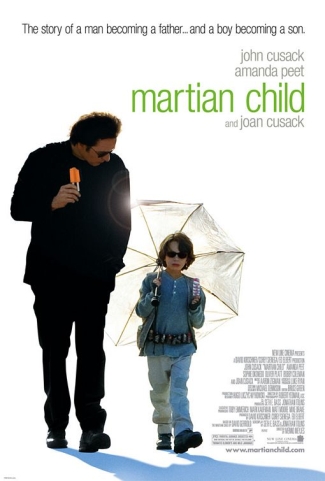
MARTIAN CHILD
US, 2007, 105 minutes, Colour.
John Cusack, Bobby Coleman, Amanda Peet, Sophie Okonedo, Joan Cusack, Oliver Platt, Richard Schiff, Anjelica Huston.
Directed by Menno Meyjes.
Martian Child was a little-seen film about parenting and adoption. It has a very strong cast. It is also quite emotionally insightful as to children, orphans, their needs, the sense of absent parents, the compensations and fantasies to overcome difficulties. The slightly-built Bobby Coleman is very good as the six-year-old who thinks that he has a mission from Mars. Coleman also appeared in Post Grad and Must Love Dogs.
The parent figure is played by John Cusack with his customary strength. He plays a science fiction writer, a widower, who encounters this little boy and decides to adopt him. The bulk of the film is about their relationship, the father figure accommodating to the little boy and his eccentricities, trying to help him to become more accepting of ordinary life. There is an emotional scene where the two relax and play in slapstick mode. There is an even more moving scene where the parent figure confronts the little boy and tries to jolt him into a sense of reality. This is reinforced by the climax on the roof of an observatory where the little boy has gone, thinking that the police helicopters are spaceships to take him back to Mars, his mission accomplished. (The original novel was written by David Gerrold where the parent figure was a gay man rather than a widower.)
The supporting cast includes Joan Cusack as John Cusack’s sister, managing with a family of her own. Amanda Peet is his deceased wife’s sister, a close friend. British actress Sophie Okonedo is a worker at the adoption agency and Richard Schiff (The West Wing) is an official. Oliver Platt fools around as the anxious agent and Anjelica Huston appears at the end as the editor.
The film may not appeal to those who do not like heart-on-sleeve family films. It is strongly emotional – but indicates the realities for adoption which are not theoretical but emotional in the relationship between the child and the prospective parents.
The film was directed by Menno Meyjes who wrote and directed the offbeat film about Hitler’s younger years as an artist at the time of World War One, Max, with Noah Taylor as Hitler and starring John Cusack.
1.A humane film, the focus on children, adoption, parent figures, family?
2.A piece of Americana, American suburbia, homes and school, orphanages? The score, the songs?
3.The title, David and his childhood, imagination, Dennis and his imagination, as an orphan, fantasy, defence and self-protection, the focus on Mars? Language, mission? Reality – and the final rescue? Accepting reality?
4.David and his television interview, the flashbacks to his life as a child, victim of bullying, growing up? His fiction, the creation of science fiction worlds? His marriage, the death of his wife, his grief? His relationship with Liz, in the past, her family? Harlee and his sister-in-law, friendship, at the grave, sharing his grief?
5.Liz and her style, helping her brother, her own family, the boys, her husband, worrying? Minding Dennis, the party? His being in the house, disappearing, the finale and her upset?
6.The adoption theme, the parent needing a child, the child needing parents? The orphanage, the range of children? The authorities? Sophie and her personal attention? Her knowledge of the children? Mr Lefkowitz? and his authority? Harlee and her support?
7.David as a potential father, Dennis in the box, David buying the gifts, the sunglasses, throwing the ball, Dennis throwing it out, emerging from the box? Dennis and his age, slight build, absent parents, seclusion? His thinking he was the Martian Child, his mission to Earth, observing and measuring, noting everything? This governing his behaviour?
8.David and Dennis together, Dennis’s room, clothes, going to the shop, the supermarket, wanting only cereal? His gravity belt, the ankle weights? The issue of gravity and his floating away, his fear? Going to school, the teasing, hanging upside down? The policeman watching David and his binoculars, their discussion about children, the officer’s child being safe, his supporting David? The interview with the teacher, Dennis being expelled, stealing from the others? The plan for the new school, David taking him, waving, waiting in the car all day?
9.David and Dennis and their talking, sharing, going out, nature, the fun park? Dennis and his taking the photos and hoarding David’s private goods? The car crash, the police and Dennis having the keys of the car? At the planetarium, his observing that it was a different Mars from the one he knew?
10.The progressive bonding, the sharing of stories? Yet Dennis determined about his mission, measuring, talking?
11.Dennis and David, the breaking down of barriers, the breaking of plates, throwing the messy goods? Mr Lefkowitz and his visit? The letter, David’s anxiety?
12.The interview, David urging Dennis to be himself? Dennis and his repeating all the words that David had told him, the quotation from Churchill, the explanation of the universe, what was being normal, his making an impression? The questions from the panel? His eventually winning them over?
13.The mission, seeing that it was over, going on the roof of the planetarium, talking to David, thinking the helicopters were spaceships, the importance of being human, the bonding between David and Dennis on the roof?
14.The book launch, the character of David’s agent and his continual urging him to write? David with writer’s block? The opening, the president of the company, her speech, demands, contracts? David pleading that she read the book, Martian Child? Reading it on the plane, weeping?
15.The process of growth, development, the needs of a child? The parent figure learning from the child? David, his future, support from Harlee, from Liz? A moving film?